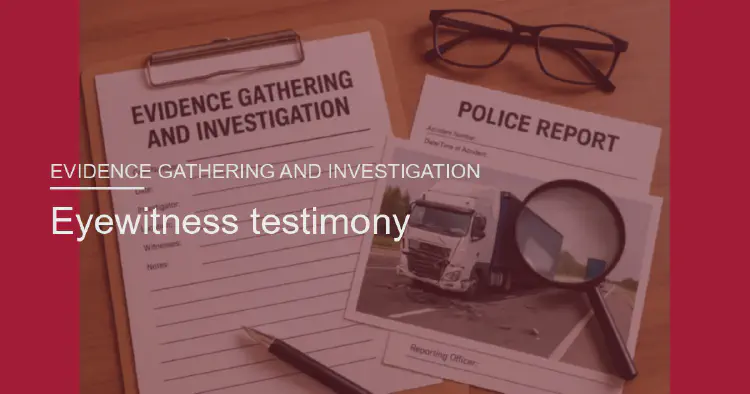Eyewitness testimony
Eyewitness testimony provides a human perspective on how a truck accident occurred. While sometimes imperfect, it can add valuable detail and credibility to a case.
- Truck Accident Law Team
- 2 min read
Article 2 of 6 in Evidence Gathering and Investigation/

Eyewitness Testimony in Truck Accident Cases
Role of Eyewitnesses
- Eyewitnesses are people who directly observed the crash or its immediate aftermath.
- Their accounts can provide critical details that may not appear in police reports or physical evidence.
Value of Eyewitness Testimony
- Filling Gaps in Evidence
- Witnesses may describe driver behavior (e.g., speeding, swerving, distracted driving) that is not captured by physical data.
- Establishing Timeline
- Eyewitness accounts help clarify the sequence of events leading to the collision.
- Supporting or Challenging Other Evidence
- Testimony can confirm or contradict driver statements, police reports, or electronic data.
Limitations of Eyewitness Testimony
- Memory Issues: Stress, shock, or distance can affect accuracy.
- Bias or Perspective: Witnesses may unintentionally favor one party.
- Cross-Examination: Defense attorneys often scrutinize inconsistencies or credibility.
Collecting Eyewitness Testimony
- Police officers typically interview witnesses at the scene and include statements in their reports.
- Attorneys may later take sworn depositions to preserve detailed testimony.
- Witnesses can also be called to testify in court as fact witnesses.
Legal Significance
- A credible eyewitness can strengthen liability claims by offering firsthand, independent observations.
- Testimony about a driver’s reckless or negligent actions (e.g., texting, speeding, ignoring signals) can be especially persuasive.
Summary: Eyewitness testimony is a valuable complement to physical and electronic evidence in truck accident cases. While not infallible, it can provide critical context and credibility when proving negligence and reconstructing the events of a crash.